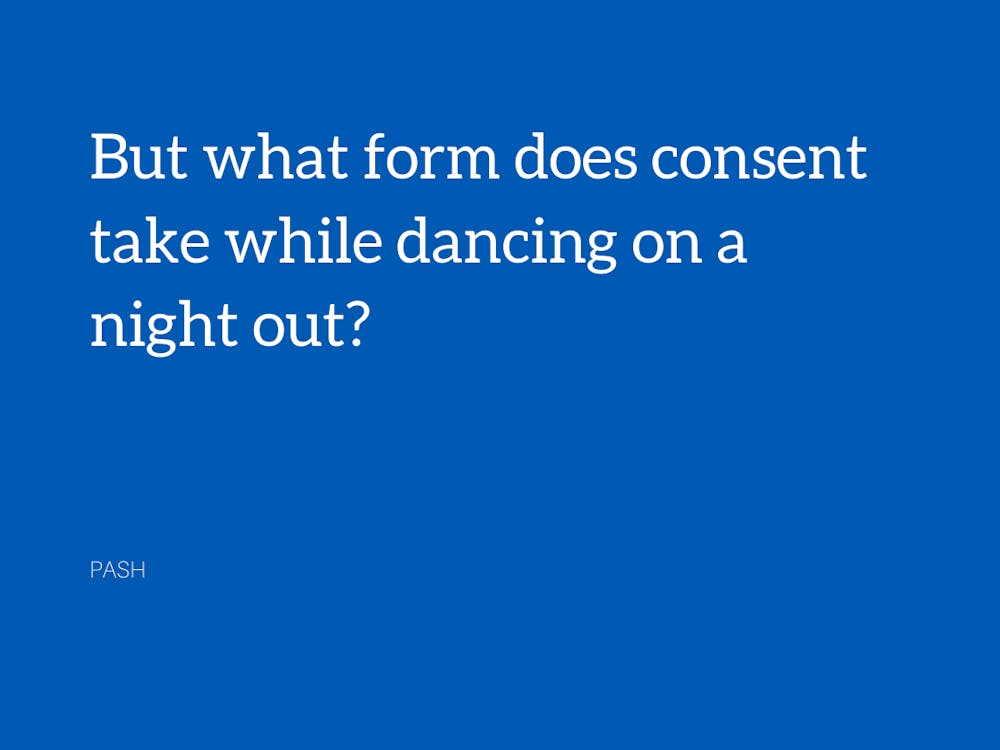Picture this—it’s another Saturday night. You’re fresh out of an Uber with your girlfriends. Black x’s? On hand. Mint gum? In pocket. That suspect-looking Dasani water bottle? Drained with a grimace and a laugh. With all the confidence of someone who didn’t just throw said water bottle away in front of the club’s bouncer, you whip out your student ID. Boom, you’re in.
After a long week of midterms, extracurriculars and all other dimensions of social, academic and professional life we Duke students field each day from eyes-open til eyes-shut, you’re excited. Because this time doesn’t belong to orgo labs of unholy length, summer program application essays demanding that you conjure your life’s narrative in 500 words or less, or those seminar readings which may have fostered your love of learning—had you not done them at 3:00 a.m. on a Tuesday. This night, this time, is entirely yours.
Your friends want to dance. You want to dance too. Between the sticky floor and invariable sweaty encounter with a slippery arm or two, claiming a spot on the dance floor is a feat of sheer willpower. But as we know, fortune favors the bold, and before long, you’re there—shoulder to shoulder with your girls, the music and your laughter carrying your hips from side to side.
Then, you feel those hands, placed with firm certainty on each side of your waist. You’ve been pulled from that circle of trusted friends with whom you chose to venture for the night; your back is now pressed against some unknown chest, your hips bordering some unknown stomach, those hands still resolute on your waist. You haven’t turned around, and yet, this is all familiar to you, because this is the invitation to dance here within the context of Duke’s party culture. In today’s column, we’re going to talk through why this poses a problem.
First, let’s get into consent. It’s a concept we’ve heard circulating since the very genesis of our time at Duke—before Duke, even, for those lucky enough to have received comprehensive sex education in high school. Consent is freely given, reversible, informed, enthusiastic and specific. Oftentimes, however, dialogues about consent exist in direct proximity to sex, as it is on a sexual landscape that the stakes of consent are perceived to exist at their greatest, that the harms of not obtaining consent are rendered most violent. So, most of us know what consent looks like in the context of sex. But what form does consent take while dancing on a night out? Is consent even necessary?
Well, yes. In the same way consent is seen as integral to sexual interaction, it too, is requisite to, say, grinding at the club. When you reach out and physically remove someone from the space they are occupying without asking, you are communicating to that person that they are small: that what they want from this night must be identical to what you want, and if not, your wants take primacy over theirs, regardless. For some, this may be a subconscious process, and for others, a bit more conscious. Either way, it’s a behavior that needs to stop, and luckily, one that can be changed through a more active recognition of the autonomy of others.
I’ll be the first to admit: for me, on some nights, it’s fun to dance on guys. Some nights, grinding on someone is full of novelty, and an opportunity to practice what my mirror is typically sole audience to. But it’s only fun when I have the opportunity to choose who I dance on and when I do it. Every night out, I see guys making ample use of their right to choose as they lean against a wall, arms folded and eyes fixated on some girl or another. Yet, for girls, it is the default assumption that, while dancing, we are inviting the attention of whichever boy is watching us, available for his pleasure.
Guys, when you don’t ask for consent to touch us, we girls must do so on your behalf. We have to look at each other and say, “Hey, do you want to dance with this person?” When we see a subtle shake of the head and slight widening of the eyes, the responsibility is then placed upon us to intervene, to provide that girl a choice where you failed to.
Disclaimer here: my own experience has seen clubbing as a largely gendered space in which guys possess the social power and girls do not. However, terms such as “guy” and “girl” are ultimately reductive in the sense that gender exists as a spectrum and not all social spaces are gendered in a heteronormative fashion. Consequently, it is important to call attention to the fact that anyone, anywhere is capable of being a victim, a perpetrator, or both.
Some people may say: “It’s not that deep.” But it is. When you hear some boy remark loudly, “If you’re not trying to throw ass, get out,” it’s impossible to come away from that statement unscathed. It seems that in our social spaces, it is a girl’s availability and proximity to a boy and his desires that dictates her worth. It’s these “insignificant” behaviors that converse and compound to produce larger systems of inequality. Rape culture was not built overnight. It stems from spaces like these.
Next time, all you have to do is ask for a dance. And wait for an answer.
PASH is a student-run organization providing resources for sexual health and relationship-building. Their column, “let’s talk about ‘it,’” runs on alternate Mondays. To ask them a question about sex or relationships, submit to this form. This column was written by Carly Jones, a Trinity sophomore and Continuing Education Coordinator of PASH.
Get The Chronicle straight to your inbox
Signup for our weekly newsletter. Cancel at any time.

